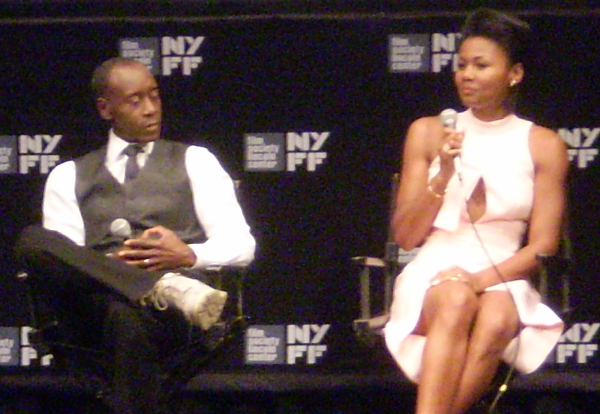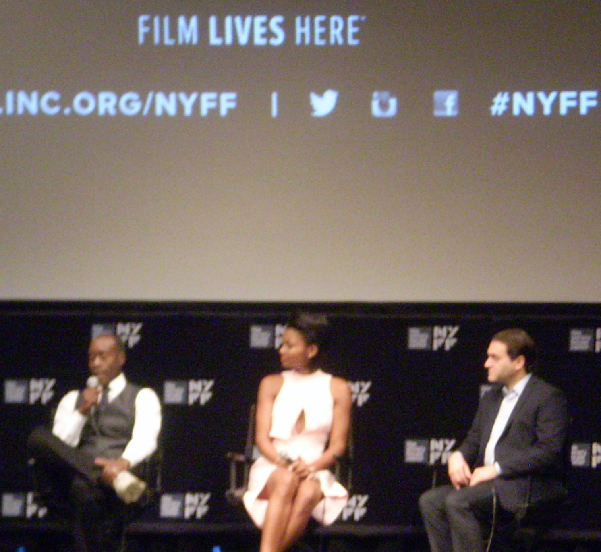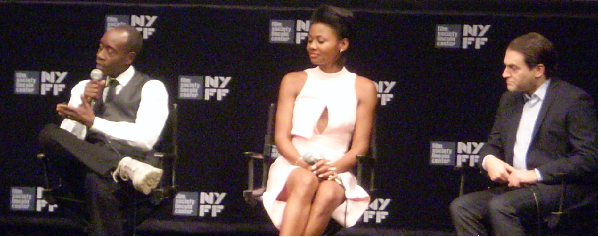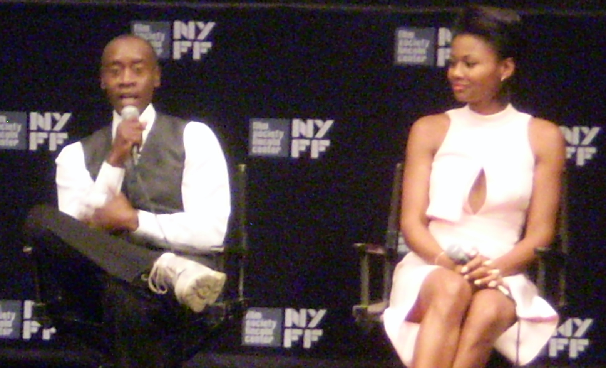Devotedly setting out to share your biggest passion with the world, whether you’re doing so for the first time, or trying to make a come-back after a much-needed break, during which you tried to revive your love for your biggest interest, can be a challenging process. Both situations provide meaningful insight into how you should best share your talent and abilities with, and leave your mark on, the world. Don Cheadle intriguingly proved his interest in diverse music by not only acting in and producing the new biographical drama, ‘Miles Ahead,’ but also making his directorial and writing debuts on the music film. The project, which grippingly chronicles how the acclaimed title jazz musician, Miles Davis, made his comeback in the late 1970s after a five-year absence, screened yesterday morning for the press at the 53rd New York Film Festival. Cheadle, as well as his co-stars Emayatzy Corinealdi and Michael Stuhlbarg, then generously participated in a press conference to discuss the movie, which later had its world premiere when it served as the festival’s Closing Night film.
‘Miles Ahead,’ which is set in the late 1970s, chronicles the end of the five-year period during which the title character (Cheadle) stopped performing. As he ponders making his comeback, an unrelenting music reporter, Dave Braden (Ewan McGregor), who claims he’s on assignment from Rolling Stone, shows up at the musician’s New York City home, hoping to get an exclusive interview. Miles is still suffering from chronic pain, as a result of his degenerative hip condition, and seems more interested in taking drugs than making his comeback.
While trying to obtain a meaningful story about Miles’s comeback album, Dave is dragged to the musician’s label, Columbia Records, where the musician tries to dispute his contract. While there, the two meet a corrupt record producer Harper Hamilton (Stuhlbarg), and his new protégé, Junior (Keith Stanfield), who’s desperately angling to work with the legendary performer. After Harper cunningly obtains Miles’s latest recording, which Columbia is eager to release, the jazz performer and the reporter set out to do whatever it takes to get it back.
As he struggles with his newest dispute with his label and the latest reporter who’s desperate to profit off of his story, Miles is subject to constant triggers that transport him back to the height of his fame in his career and personal life. The composer vividly recalls his courtship and ultimately failed marriage to dancer Frances Taylor (Corinealdi), who’s presented as having the most influential impact on his music and life. Frances serves as the representative combination of life and art that Miles never managed to fully grasp earlier in his career, and is still desperately trying to obtain.
Cheadle opened the press conference by noting that making his film about the Grammy Award-winning jazz musician was a long time coming. “The idea about making a movie about Miles came onto my radar after people were talking about it for years,” the filmmaker revealed, before adding that there were many different notions about how to make a movie about the title character. The first-time helmer explained that he finally became attached to the idea when Davis’ “nephew, Vince Wilburn, announced that I was going to play him when he was induction into the Rock and Roll Hall of Fame” in 2006. Cheadle then thanked Wilburn, who was in the audience during the festival’s conference. After the casting news was revealed, different producers reached out to the actor, in order to figure out the best way to make the biographical drama.
When he was approached by the various producers, Cheadle was “presented with various takes that I felt were standard biopic stories that chronicled all the events in (Davis’) life,” including when he met American jazz saxophonist and composer Charlie Parker. “I just wasn’t interested in telling that type of story for this particular artist, who was always trying to do things differently than what had already been done,” the filmmaker revealed. The first-time writer added that he wanted to make a movie that Davis would have wanted to star in himself.
“When I spoke to Vince and the rest of (Davis’) family, I asked them if that would be something they would be cool with, rather than a standard telling of his story,” Cheadle further explained. “They said yes, and that he would have preferred for us to do something different and more dynamic than a documentary could do a lot better (at showing his entire life). So (the drama’s co-writer) Steven Baigelman and I said, ‘Okay, we’re not going to make a chronological movie.'”
Cheadle was then asked how he handled his multiple duties on making ‘Miles Ahead,’ and he revealed the process was “daunting. I was glad that I had a lot of time to do it.” The filmmaker added that if the project hadn’t fully come together three years ago, “I would have been relieved, in a way, because it was just so hard…The budget started at $20 million,” before it finally settled at what he approximated to be $8.5 million. “We still had to come up with various ways to get the money together, including an Indiegogo campaign.” While he admitted that every step was difficult, the year before the musical film came together, “it started to feel more like a mandate to do it, rather than something I could get away from.”
The director added that “We needed everything that went into our being able to make this film. It’s an independently financed film, and we were fortunate enough to be picked up by Sony Pictures Classics for the domestic distribution…Before they got this product, we had to get it made. One of the ways the financing came together was through this crowdfunding, which we were ambivalent about doing at first,” Cheadle admitted. “We didn’t know if it would say something strange about the movie, and that nobody believes in it.” But he came to appreciate the public’s support, particulalry after the newness of the platform began to wear off, as the crowdfunding really helped move the film’s production forward.
Corinealdi praised her director and co-star’s determination, saying that working with Cheadle was “a dream. Working with Don is about the artistry, since he’s an actor…Working with him on this kind of a project, which is something that’s so close to his heart, and is a passion for him, was wonderful. I couldn’t have asked for anything better, and knew the experience was going to go well.” The actress added that having the opportunity to portray Taylor, who meant so much to her, was also an honor and a rewarding process. Corinealdi admitted she looked forward to playing the musician’s wife everyday she was on the set.
The scribe-helmer-actor then noted that showcasing Davis’ music was the main driving force for him as he set out to make ‘Miles Ahead.’ “I wanted to be able to put all of Miles’s music into the film; well, all that we had the rights to. I didn’t want to be stuck within one period of music. Had we told it in a way that was chronological, was cradle to the grave and a standard telling, we would have been pigeonholed into these specific moments that coincided with the music,” Cheadle explained. “I wanted to approach the music in the film in the way that I experience his music when I listen to it…His music feels like it’s different soundtracks to different elements. I see stories in my mind when I listen to his music. So I wanted to create a piece in which the music could support those stories.”
Cheadle then began discussing how movie audiences, particularly those who are jazz listeners, will respond to the biographical drama. “That remains to be seen-I don’t know how it will be received,” the filmmaker humbly noted. “I hope they come to it with the same expansive viewpoint that Miles had.” The performer noted that in the beginning of the movie, the reporter interviewing Davis refers to his music as jazz, and the musician tells him not to call it by that genre. The trumpeter felt that only calling his music jazz boxed him in, so he instead wanted his work to be referenced as social music, Cheadle further revealed.
“People were trying to lay a sign on him that he never put on himself,” the film’s lead actor pointed out. “He went to where his inspiration lead him. He was always trying to find the next thing…I think the movie is trying to represent that he was a multifaceted artist, and not strictly just a jazz musician.”
The filmmaker then delved into the reasoning why he and Baigelman decided to incorporate the presence of Dave Brill as a Rolling Stone writer into ‘Miles Ahead.’ “Well, I have been in several biopics, and have sat next to the people I have portrayed. I played Paul Rusesabagina in ‘Hotel Rwanda,’ as well as Sammy Davis Jr. in ‘The Rat Pack,’ and scenes would come up in the scripts.” Cheadle laughed as he added, “I would turn to Paul and ask, ‘Is this pretty much how it was?’ He’d go, ‘It’s close enough.’ What we all know with these stories is that to some degree, they’re all historical fiction…You clearly can’t capture someone’s life in 90 minutes to two hours…There are characters who are created, and scenes take place in different settings.” Cheadle added that as a result of that creative license, he didn’t want to state that ‘Miles Ahead’ is an entirely true story. “So I wanted to say, if I’m going to tell a story, I’m going to tell it in this fashion. I want it to be creative and interesting.”
The filmmaker then divulged that as a result of that storytelling path he chose to follow, the “Dave Brill character is a composite of many different people, who were trying to get these interviews from Miles. Many of them thought they would be the last one to interview him, as his obituary had been written during that time…Meanwhile, others were trying to get his comeback story,” Cheadle noted. “I thought (his) fighting to come back, and trying to find (his) voice…was relatable to everybody.”
Watch a clip, and check out Shockya’s exclusive photos, from ‘Miles Ahead’s press conference at the 53rd New York Film Festival below.





Written by: Karen Benardello
